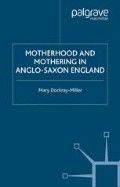Abstract
Motherhood is becoming respectable, finally, in feminist circles. For years it was something to be ignored, embarrassed about, or evaded as feminists defined themselves as daughters rather than as mothers.l This focus shifted slightly in 1976 with the publication of Adrienne Rich’s landmark study Of Woman Born, which differentiates between “Motherhood as Experience and Institution” (her subtitle), meaning between the patriarchal institution of motherhood, and women’s actual experience of motherhood, which Rich reads to be empowering and illuminating. Motherhood as a subject of analysis has since gained legitimacy in U.S. academic feminism as the last of the baby boomers have their children and “parenting” and “families” are the buzzwords on every politician’s lips.
Access this chapter
Tax calculation will be finalised at checkout
Purchases are for personal use only
Preview
Unable to display preview. Download preview PDF.
Notes
Allen J. Frantzen, “When Women Aren’t Enough,” Speculum 68 (1993): 446.
Judith Bennett, “Medievalism and Feminism,” in the same Speculum volume as n.2; the essays in this volume were subsequently released as Studying Medieval Women: Sex, Gender, Feminism, ed. Nancy Partner (Cambridge, MA.: Medieval Academy of America, 1993).
A typical example is Sanctity and Motherhood: Essays on Holy Mothers in the Middle Ages, ed. Anneke B. Mulder-Bakker (New York: Garland, 1995).
An exception is the collection Medieval Mothering, eds. John Carmi Parsons and Bonnie Wheeler (New York: Garland, 1996), which includes historical analyses of mothers with growing children as well as investigations of pregnancy, spiritual motherhood, and maternal tropes in religious discourse.
Clarissa Atkinson, The Oldest Vocation: Christian Motherhood in the Middle Ages (Ithaca: Cornell University Press, 1991), 94 and 115.
Ibid., 162 and 195; see all of chapters 5 and 6.
Christine Fell, Women in Anglo-Saxon England (Oxford: Basil Blackwell, 1984).
Jane Chance, Woman as Hero in Old English Literature (Syracuse: Syracuse University Press, 1986).
Helen Damico and Alexandra Hennessy Olsen, eds., New Readings on Women in Old English Literature (Bloomington: Indiana University Press, 1990).
A sampling of gender-theoretical readings of Anglo-Saxon poetry in the past decade would surely include Gillian Overing, Language, Sign, and Gender in Beowulf (Carbondale: University of Illinois Press, 1990); Clare Lees, “Men and Beowulf’ in Medieval Masculinities, ed. Clare Lees (Minneapolis: University of Minnesota Press, 1994), 129–138;
James Hala, “The Parturition of Poetry and the Birthing of Culture: The Ides Aglœcwif and Beowulf,” Exemplaria 10 (1998): 29–50;
Karma Lochrie, “Gender, Sexual Violence, and the Politics of War in the Old English Judith,” in Class and Gender in Early English Literature: Intersections, eds. Britton J. Harwood and Gillian R. Overing (Bloomington: Indiana University Press, 1994), 1–20.
The other essays in these collections, as well as those in Speaking Two Languages: Traditional Disciplines and Contemporary Theory in Medieval Studies, ed. Allen J. Frantzen (Albany: SUNY Press, 1991), address concerns of postmodern theory as well.
Clare A. Lees and Gillian R. Overing, “Birthing Bishops and Fathering Poets: Bede, Hild, and the Relations of Cultural Production,” Exemplaria 6 (1994): 35–66.
See M. L. Cameron, Anglo-Saxon Medicine (Cambridge: Cambridge University Press, 1993).
Judith Butler, Gender Trouble: Feminism and the Subversion of Identity (New York: Routledge, 1990), 25.
Sara Ruddick, Maternal Thinking: Toward a Politics of Peace (Boston: Beacon Press, 1989, repr.1995), 41.
Ibid., 17.
Copyright information
© 2000 Mary Dockray-Miller
About this chapter
Cite this chapter
Dockray-Miller, M. (2000). Maternal Performers. In: Motherhood and Mothering in Anglo-Saxon England. The New Middle Ages. Palgrave Macmillan, New York. https://doi.org/10.1057/9780312299637_1
Download citation
DOI: https://doi.org/10.1057/9780312299637_1
Publisher Name: Palgrave Macmillan, New York
Print ISBN: 978-1-349-38583-6
Online ISBN: 978-0-312-29963-7
eBook Packages: Palgrave History CollectionHistory (R0)

